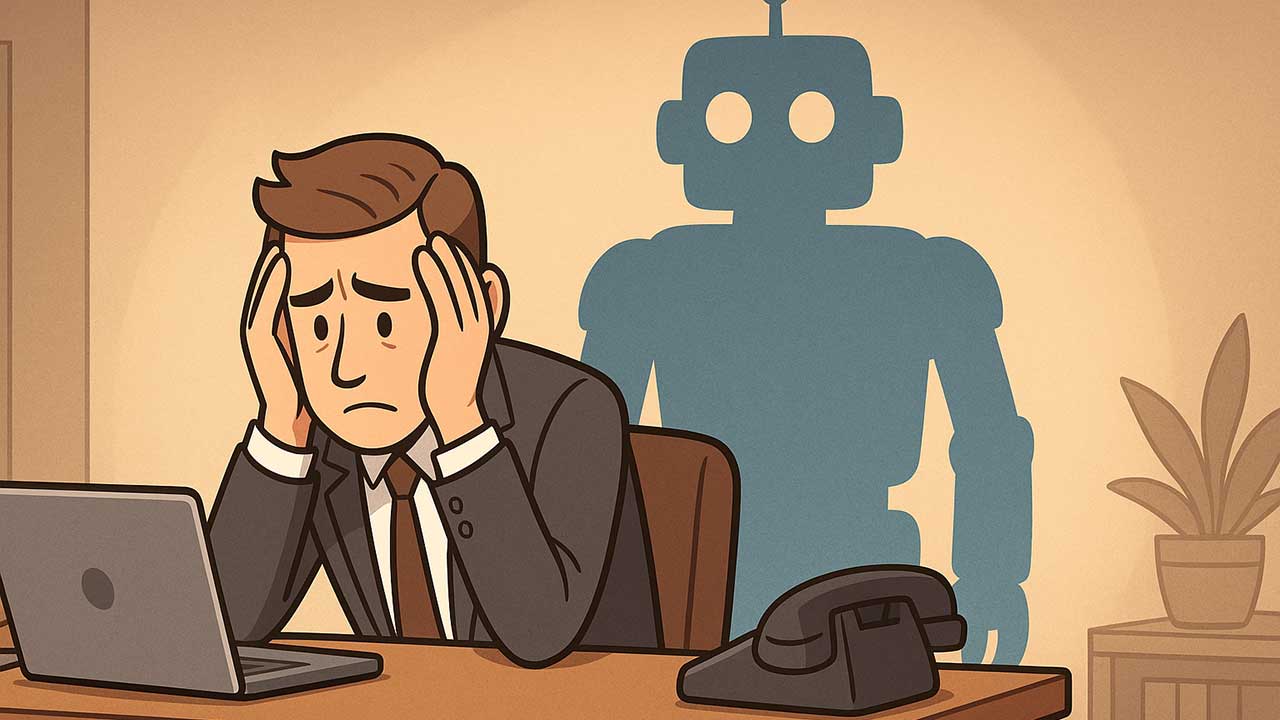When AI Makes You Question Your Identity

Last week, I was facilitating an AI workshop for a group of senior executives at one of our F500 clients. As we explored ways to integrate generative AI into their workflows, the atmosphere was both energized and strangely hesitant. It wasn’t explicit, no one raised their hand and confessed to being terrified of AI, but I could feel an underlying tension. I’ve encountered it before, a subtle yet palpable fear academic researchers call “Identity Threat.”
Identity Threat is the anxiety people feel when they realize AI can do things we thought only humans could do. It kicks in after the initial “will AI take my job?” fears fade. Once people master these tools and see their productivity soar, a deeper discomfort sets in. They quietly wonder, “If AI can perform my work at this level, will I have any real value?” This isn’t automation anxiety; it’s much deeper.
When the Smiles Fade
I’ve sensed this anxiety countless times during the Q&A segments of my speaking engagements or in side conversations after training sessions. The smiles fade, the jokes stop, and there’s an almost audible internal dialogue of doubt. I can literally feel it.
I’m curious if this resonates with you. Have you felt it or discussed it with friends and colleagues? I’ve started explicitly asking people about Identity Threat. And, when I frame it as something others have expressed, the floodgates open, revealing deep, unspoken anxieties.
The Hidden Cost of Silence
The cost of leaving these anxieties unaddressed is significant. I’ve watched talented professionals become paralyzed by self-doubt, teams fracture as members compete to prove their irreplaceability, and organizations stall their AI initiatives not due to technical challenges but because of this unspoken psychological resistance. When Identity Threat festers in silence, it breeds resentment, resistance, and a kind of professional existential crisis that saps creativity and collaboration.
Intelligence Decoupled From Consciousness
Here’s what I’ve come to understand: AI isn’t going away. We live in a world where intelligence is decoupled from consciousness, where machines can process, analyze, and create without awareness, without feeling, without the lived experience that shapes human judgment. This is our new reality. We share our planet, our lives, and our careers with intelligent tools that execute tasks with superhuman precision. No human will ever calculate faster or generate text quicker than AI. But speed and execution aren’t magic; they’re mechanics. Let me be clear: some roles are genuinely being transformed, others eliminated. Pretending otherwise serves no one. But even as AI reshapes the landscape of work, it cannot replicate what makes us fundamentally human.
Humans are magic. We create from a place of lived experience. We empathize because we’ve felt pain, joy, and everything in between. We love, inspire, feel, and connect in ways that emerge from consciousness itself. Our greatest strength isn’t execution, it’s inspired creativity born from genuine emotion, intuition shaped by experience, and the ability to understand the nuance of what it means to be human.
AI handles what I call “required creative,” the routine output that needs efficiency and consistency. There will likely never be a five-year-old with a scraped knee who seeks comfort from a robot. Nor will there be a great CEO navigating a company through crisis who wants strategic counsel from something that has never felt the weight of consequence, or a team seeking inspiration from an entity that has never experienced the satisfaction of shared achievement.
Embracing What Makes Us Human
The way forward isn’t to resist or fear AI, but to embrace our humanity more fully and consciously. For business leaders, this means fostering cultures that elevate emotional intelligence, empathy, and creative thinking as core competencies, not soft skills. It means recognizing that as AI handles more of the mechanical, the human becomes more valuable, not less. We must inspire our teams to see their distinctively human capabilities: judgment born from experience, wisdom shaped by failure, and creativity sparked by joy or frustration as irreplaceable assets in an AI-augmented world.
Breaking the Silence
Perhaps most importantly, we must name this fear. By acknowledging Identity Threat openly, we transform it from a source of shame into a shared challenge we can address together. In my workshops now, I dedicate time to this conversation. The relief is palpable when people realize they’re not alone in their anxiety, that questioning one’s value in an AI world isn’t weakness, it’s a natural response to profound change.
The solution isn’t simple or singular. But I’ve found that when organizations create space for these conversations, when leaders demonstrate vulnerability by sharing their own Identity Threat experiences, something shifts. Teams begin to see AI not as a competitor but as a tool that frees them to be more human, not less. They start identifying and developing the uniquely human skills that no algorithm can replicate.
The Power of Being Human Together
In the end, the very act of gathering to discuss our fears, supporting each other through this transition, and laughing about our anxieties while strategizing our adaptation is what matters most. This messy, beautiful, inherently human process of making meaning together might be the most powerful reminder of why we remain irreplaceable. Our magic isn’t just in what we do, but in how we navigate uncertainty together, creating connection and purpose in a world of constant change.
More By This Author:
OpenAI’s Browser Play: The Real War For The WebSenate Strips AI Regulation Ban From The Big Tax Bill
The Age Of AI SlopComs Has Arrived
Disclosure: This is not a sponsored post. I am the author of this article and it expresses my own opinions. I am not, nor is my company, receiving compensation for it.



